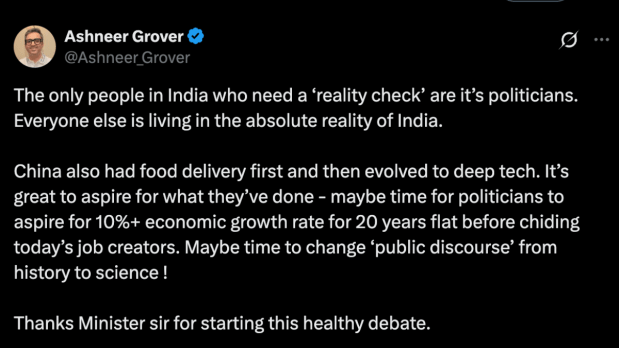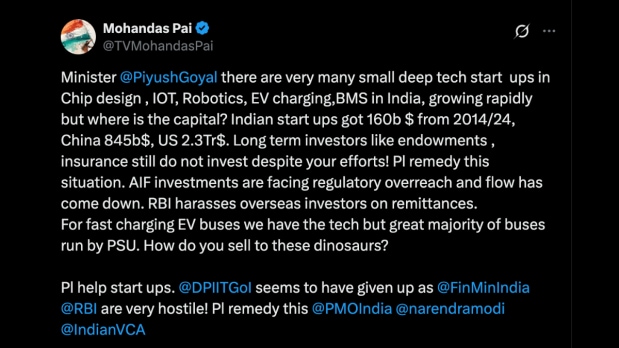Ashneer Grover, who co-founded payment app BharatPe in 2018, said that “Indian politicians need a reality check” after Union Minister Piyush Goyal criticised Indian startups at Mahakumbh and compared them to those in China.
Grover, who appeared as a judge on the inaugural season of the business reality show Shark Tank India, argued that even China began its startup journey with food delivery before transitioning into deep tech. His remarks come in response to Goyal’s sharp critique of the quick commerce sector for delivering groceries and food in minutes.
“The only people in India who need a ‘reality check’ are its politicians. Everyone else is living in the absolute reality of India,” Grover said in response to Goyal’s reality check at Mahakumbh, where he suggested that Indian entrepreneurs need to reassess their direction.
The 42-year-old added, “China also had food delivery first and then evolved to deep tech. It’s great to aspire for what they’ve done – maybe time for politicians to aspire for 10%+ economic growth rate for 20 years flat before chiding today’s job creators.”
He thanked Goyal for starting a healthy debate on Indian startups, adding, “Maybe time to change ‘public discourse’ from history to science!”

Mohandas Pai, former Infosys CFO and chairman of Aarin Capital, also pushed back against Goyal’s comments. He emphasised that India does have a growing deep tech ecosystem like China, but it suffers from a lack of adequate capital and government backing.
“There are very many small deep tech startups in chip design, IOT, Robotics, EV charging, BMS in India, growing rapidly, but where is the capital?” asked Mohandas Pai on X (formerly Twitter).
He pointed out that from 2014 to 2024, Indian startups attracted only $160 billion in funding, while China and the United States received $845 billion and $2.3 trillion, respectively.
The former Infosys CFO further mentioned that India already has technology for fast-charging electric buses, but its adoption is hindered by the fact that most buses are run by public sector undertakings (PSUs), which slows innovation.

‘Dukandari karni hai…’: Piyush Goyal at Mahakumbh
During his speech at the event, Commerce and Industry Minister Piyush Goyal questioned whether people want to merely run general stores or help build India’s identity on a global stage. “Dukandari ka hi kaam karna hai ya vishwavyapi aur international scale par Bharat ki pehchaan banani hai?” he asked.
He added that while China is investing in cutting-edge technologies like artificial intelligence (AI) and innovative mobility, India is providing convenience at the cost of cheap labour.
“We are focused on food delivery apps turning unemployed youth into cheap labour so the rich can get their meals without moving out of their house. And what does a Chinese startup do? They work on developing electric mobility battery technologies, and they are today dominating the electric mobility ecosystem,” the minister said.
He then said that he has no reservations against Indian startups foraying into the quick commerce industry, but then he can’t take “grocery stores” to international trade agreements with top countries and say that India has these kinds of startups to offer.
India vs China startup reality check
Goyal said that Indian startups are “turning unemployed youth into cheap labour to deliver meals to the rich people” at a time when China is dominating the global EV market, investing heavily into semiconductor development, AI models, next-generation manufacturing, space technology, high-speed rail, and renewable energy.
He also criticised gourmet ice creams and cookies marketed as “healthy”, and instant grocery delivery apps, which he claimed are fostering a culture of “laziness” and “impatience”.
Goyal also expressed concern over betting platforms and fantasy sports apps, which he believes promote gambling and addiction. He added that Indian influencers are contributing to a “growing culture of mindless entertainment”.

